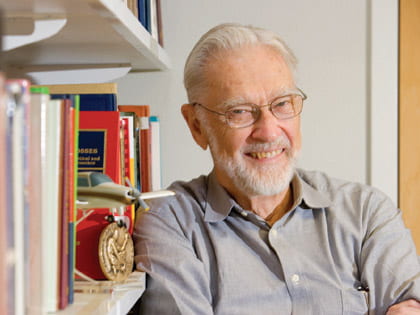Risk's reward
Respected social scientist earns high honors for his life’s work

Mention UCI in any gathering of economists or social scientists and someone inevitably chimes in, “Oh, Irvine. That’s where Duncan Luce is.”
For more than 50 years, no scholar has more profoundly influenced the field of mathematical psychology than R. Duncan Luce, Distinguished Research Professor of Cognitive Sciences and Economics. “His work in game and choice theory has inspired others and set the stage for groundbreaking advances in economics as well as psychology,” said Chancellor Ralph J. Cicerone as he awarded Luce the 2001 UCI Medal.
To be sure, awards and honors have come Luce’s way: memberships in the most prestigious academies, the American Psychological Foundation’s Gold Medal for Life Achievement and, on Jan. 27, he will receive the Daniel G. Aldrich Jr. Distinguished University Service Award for internationally renowned scholars whose outstanding service has led to the betterment of large segments of the UCI community.
Two generations of students have revered Luce’s classic texts onIndividual Choice Behavior and Games and Decisions (with Howard Raiffa). He is widely considered a founding father of mathematical behavioral sciences, using math models to describe how people process information and make choices when facing risky decisions such as buying stocks or having surgery.
He is quick to admit that his own life has involved a number of risks and outright gambles. He piloted small planes years ago until he decided that was too risky. Riskier still, he switched fields early in his career from aeronautical engineering – his undergraduate major at MIT – to a doctorate in mathematics, eventually applying his combined talents to the behavioral sciences.
After a three-year stint at UCI in the early 1970s, he went on to chair the psychology department at Harvard for three years. A nasty fall on the ice in Cambridge, along with an offer to create UCI’s Institute for Mathematical Behavioral Sciences, and the campus’s well-known strength in that field, brought him back to Irvine in 1988.
“Collaboration among disciplines – both socially and professionally – is embedded in the UCI culture more than it seemed to be for psychology at Harvard, and that appealed to me,” says Luce, who sets the standard of academic citizenship with a soft-spoken wisdom that commands respect.
“It’s unusual to have a single scholar make groundbreaking discoveries in several fields and one who so selflessly contributes to the university on all levels,” says School of Social Sciences Dean Barbara Dosher. “He has served on committees, recruited new faculty and moved graduate education forward campuswide.”
Among his many contributions, Luce chaired the committee that established the Department of Statistics and served on search committees for three UC chancellors.
By any calculation, Duncan Luce’s own choices and gambles have paid off for UCI in dedicated leadership, international visibility and unfailing collegiality.

